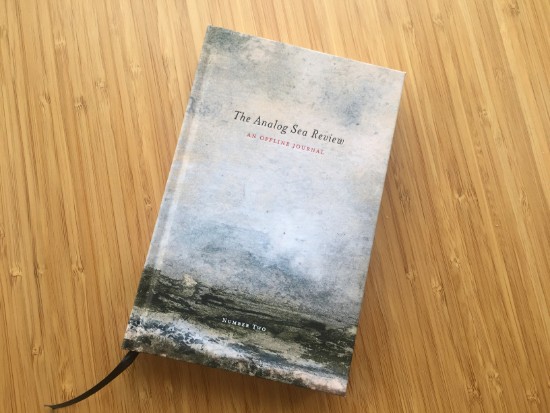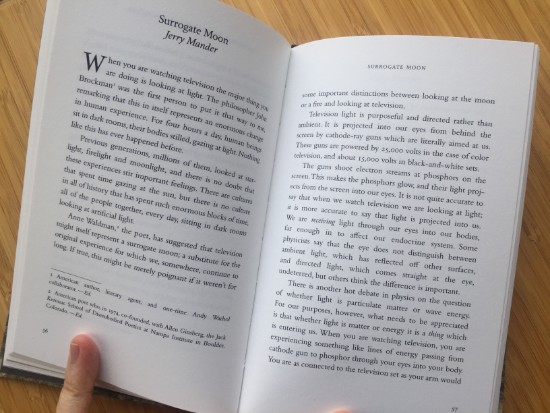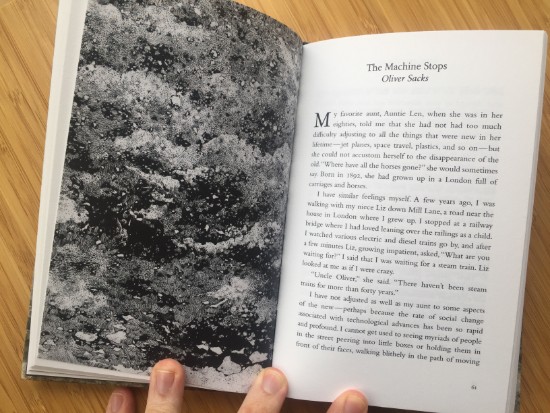Lunch Break, He Wasn’t There
Oh, this is fun. A forum thread of clever, grumpy comedy fans discussing times they (and others) have quit jobs in style.
A terminally unemployed mate who finally decided to join the rest of us at the only place nearby that was offering paid work at the time, a huge greenhouse growing tomatoes, aubergines and the like. We were very encouraged that he had taken this important step and confident that it would be the springboard that set him on the right path in life.
Day one: morning break, he was in the corner of the canteen almost scratching his entire face off as his various skin complaints had flared up in the heat and turned his head into a giant flakey raspberry.
Day one: lunch break, he wasn’t there. I later found out he got stung on the arse by a wasp and told his line manager to go and fuck himself.
Another poster gives us an additional link to even more stories of gorgeous walk-outs:
I worked […] at a mismanaged grocery chain that is now out of business. I was a cashier but they had a 16-year-old girl working behind the fish counter (which was illegal) and who was not being paid properly for the work she was doing (because she wasn’t supposed to be doing it!).
On Sunday, the beginning of the pay period, she clocked in, wrote I QUIT in cod, haddock, and tilapia filets in the seafood counter, and clocked out. She framed a photo of her masterwork and her last paycheck for $2 and hung it in her bedroom.
Haha. Fantastic.
The Point of Retiring
My (happily retired) mother-in-law in Canada sends me an article from the “Seniors” section of the Montreal Gazette:
here’s to the bone idle life. It will surprise you how little guilt you feel, how easy it is to dismiss the non-believers. Because doing nothing might be the best thing you never thought you’d do.
Apparently, there’s an increasing expectation placed on those ready to retire either not to do so (to cling on to their career and paycheque for as long as possible) or to stay economically active through world travel or other costly consumerist joys.
The writer of the piece rightly encourages her fellow seniors to ignore this expectation and to retire fully by embracing “the bone idle life.”
Oh, there is the morning routine of coffee and newspapers at the local café. The visits with Mom, who is 93 and still doing daily floor exercises. There are pies to bake, documentaries to watch, beaches to stroll, books to finish, family to spoil, sales to shop.
And really, wasn’t that the point of retiring?
Couldn’t agree more, could we, Ecapologists?
Double-Entry

In a state of splendid self-isolation, I’ve been reading Christie Malry’s Own Double-Entry (1973) by B.S. Johnson.
It’s about a frustrated office worker who goes to ridiculous lengths to reclaim his dignity. In fact, he becomes a terrorist so I hesitate to mention him as someone to relate to BUT it’s all played for absurdist laughs against a 1970s (rather than post-9/11) backdrop and there are other things going on in this extraordinary novel too. It’s very short and very funny and very Twentieth-Century in tone while at the same time being fourth wall-breaking with a comedic lightness of touch. I recommend it.
Here’s Johnson’s description of Christie’s office:
The atmosphere was acrid with frustration, boredom and jealousy, black with acrimony, pettiness and bureaucracy.
I think that’s excellent. B.S. Johnson saw the novel as a dated outlet for storytelling and his way of rescuing it was to write from a spiritual/internal/reflective viewpoint: perspectives that TV and film would struggle (and continue to struggle) with. And it’s a good reflective description of an office. It’s certainly how my old workplace felt to me.
The novel begins with a calculation worthy of an Escapologist: how long ’til retirement? He works out that he can retire “early” but is still appalled by his lot:
Christie was silent even at the information that he had only forty-three and not forty-eight years before he was free.
Anyway, it’s a good book. You can read a little more about it here but I advise against spoiling the plot for yourself if you plan to read it.
*
I’m preparing to drop an early newsletter with a short editorial on the pandemic as well as the usual digest of Things Escapological. Join our mailing list if you’d like to get in on the [in]action.
“The World of Work Needs a Wholesale Redesign.”
This is a Feminist argument for escape from Invisible Women by Caroline Criado Perez:
Women have always worked. They have worked unpaid, underpaid, underappreciated, and invisibly, but they have always worked. But the modern workplace does not work for women. From its location, to its hours, to its regulatory standards, it has been designed around the lives of men and it is no longer fit for purpose. The world of work needs a wholesale redesign–of its regulations, of its equipment, of its culture–and this redesign must be led by data on female bodies and female lives. We have to start recognising that the work women do is not an added extra, a bonus that we could do without: women’s work, paid and unpaid, is the backbone of our society and our economy. It’s about time we started valuing it.
I have sometimes wondered if the workplace is a male-orientated space and that this is part of the underlying problem with it. After all, many of the things I hated about office life (lack of privacy, too much noise, the “bullpen” concept, plastic everything, hopeless food, extrovert worship, the idea that we should tolerate discomfort, pranks, high-fives, nicknames, hostility towards the health and safety department, hostility towards measures of equality and diversity, inflexible hours, resistance to working from home, obsession with car-parking facilities over convenient access to public transport, the conversion of a Quiet Room into a “Situation Room”) could without much stretch of the imagination be seen as the vestiges of a male world. Would offices have looked like this under a matriarchy? Maybe. But a hunch–a suspicion–says no.
I remember hearing years ago about “sexist air conditioning” that leaves female office workers uncomfortably chilly while their male colleagues are as happy as can be.
This book actually has the answers. In the case of air conditioning, nobody in the office said “it’s important that men are comfortable and women are not,” but rather it’s because the settings of office air-con really are based on data derived from the study of men and not, as one might imagine, equal numbers of men and women. This is only the beginning though, as the work chapter of Criado Perez’s book explains, and there are endless examples of systems and technologies failing women (and ultimately everyone) because of this data gap.
Essentially, the world was built on the premise that “the male” is the default human while “the female” is some sort of aberration or “alternate” rather than, as the case obviously is, naturally half of the population. Why exclude? It’s amazing. (The “default male” concept is explained succinctly in the book’s intro which you can read online).
Invisible Women is a brilliant, glistening book, extremely readable despite being data heavy, and each case study presented is there for a good reason. Each one proves so many points and, if the world would only respond to this book, it would be win-win-win: better for women, better for men, better for everyone. (In case you’re wondering, the book and its author are not “down on men;” the author is keen to point out that many of the inequalities being discussed are a result of the data gap, which results from decisions badly-made long ago, rather than individual, conscious acts of misogyny — though, actually, it makes little difference since the result is the same). It’s a brilliant, challenging, extremely important book about the consequences of ignoring half the population. Read it!
Russell and Keynes Ride Again
Few things sound more southern California than “Let’s shorten the workday to have more time to surf!” But shortening the workday to boost productivity and improve the company? That’s pretty counterintuitive.
This item in the Guardian today is a brutal read if, like me, you struggle to digest the passive voice or the word “paddleboard.” I offer it here, however, as more happy evidence of the world waking up to the Big Sausage Energy of the shorter working week.
The article offers a case study of a finance company reducing their working hours (but not their salaries) as an experiment in productivity. Now, New Escapologist doesn’t tend to focus on productivity as a reason to reduce toil (I’d say let’s reduce work so that we can do something else with our time, ideally something that doesn’t involve raiding the screaming Earth for yet more “materials”) but if that’s how we can get the grindstone boys on-side, then that’s fine.
I also find the “experiment” element of this story impressive: they tried it for 90 days, vowing to keep the new system if it worked. Every good thing should start that way, shouldn’t it?
It’s always nice to see Russell and Keynes deployed to good effect:
And we really need to improve work. A century ago, the philosopher Bertrand Russell and the economist John Maynard Keynes argued that by 2000 – eight decades in their future and two decades in our past – we could all be working as little as three or four hours a day. In Russell and Keynes’s lifetime, technology, labor unions, rising educational standards and greater prosperity had reduced the length of the average workday from 14 to eight hours a day. They thought that as technology continued to advance through the 20th century, productivity could continue to rise, economies could continue to grow and working hours could fall further.
But Russell also warned that while “modern methods of production have given us the possibility of ease and security for all”, if productivity gains and profits were hoarded by factory owners, executives and investors, those same advances could be used to create a world that offers “overwork for some and starvation for others”. That’s not a bad description of work today.
The article is on side. Thanks, Guardian. The comments are unusually encouraging too: lots of love for work reduction and teleworking, plenty of people defending the (i.e. our) critique of the work ethic.
Looking for Wisdom? No Need to Wait for Sudden Peril
Reader Antonia writes from Italy:
With the new virus (and related anxiety) spreading over Italy these past weeks, lots of people are working from remote. While the overall issues about purpose, working hours, etc. are not being directly addressed, for many jobs working from home is proving to be just fine…
Similarly, Tom muses in the Idler this week that the Coronavirus might lead to green-minded and idler-compatible working practices. He quotes the Financial Times: “China’s coronavirus-related slowdown has wiped out the equivalent of the UK’s carbon emissions over six months.”
So we’ve learned that people working from home (using technology and systems that have been in place for over a decade) instead of expending resources in travelling to spiritually-corrosive and uncreative workplaces can lead to an easy reduction in harmful pollution and carbon emissions. Amazing.
Antonia:
…I wonder did we need an epidemic to realize that?
I think this is an excellent question. It’s crazy that it would take the terror of an epidemic to make people realise that (a) remote working is easy and beneficial and (b) the eradication of commuting would decrease pollution and carbon emissions. Why can’t we just have foresight?
It reminds me of the cancer journals I wrote about in Escape Everything! After reading a selection of diaries left to a hospital library by the terminally ill, I noted that people tend to come to the same conclusions about life when they’re facing death. They conclude that time with family and friends are the important thing, that work and career and striving were a harmful waste of time. It was sad to read but I couldn’t help thinking “why did it take a cancer diagnosis to make you understand this?”
It’s almost as if it weren’t the central message of almost every religion, philosophical system, and Hollywood movie ever made.
It shouldn’t take illness and the fear of immediate death to assess (and commit to) one’s priorities. You could do it right now.
(It is not my intention in this post to be flippant about Coronavirus. If you’re actually worried about it, the Guardian published some nice reassurances this morning).
The Answer is not the Office
We are all different from each other, and we work in different ways. Still, we must all come together to the office, usually an ugly building with lousy coffee, at a predetermined time and stay there for at least 8 hours. Of course, eight hours are just for lazy, uncommitted employees. The real heroes are proud of working night shifts and making you feel bad when leaving the office earlier. Going home on time is a form of treason.
“Strong agree” with this nice article by Fernando Silvestrin about the office as a place in which good (i.e. deep, creative, worthwhile) work can’t possibly get done.
While offices are the only place built specifically for us to get the job done, we don’t actually get any work done at the office – especially creative work. But isn’t answering emails, attending meetings and listening to your boss, what we call “working”? Not really.
Just like us, Fernando has a fine newsletter on the subject of work and idling. Newsletters, my friends! They’re the way to go.
An Escapologist’s Diary. Part 60. The Fireplace.

A rare opportunity for a minimalist purge arose today. Oh yes indeedy.
When we first moved into Escape Towers over four years ago, this fireplace (pictured) was adrift in the middle of the floor in the otherwise empty main room.
We had no such appliance as an electric fire or television set for it to frame, nor was it attached to the wall in the spot where a wood or coal fire would once have stood. It was just there, in the centre of the room; a heavy, dirty, useless, suburban-looking, possibly Alpine-inspired fireplace.
Since it was surely the property of the landlord and therefore our responsibility to keep safe lest we lose our deposit, we tucked the fireplace sideways into the hall closet and tried to forget about it.
Tried to forget is the key thing here. As a minimalist, I have a sensitive, almost spiritual, awareness of every item under my jurisdiction. If something’s not right–if an alien object should trespass or something of ours should go missing–I’ll know about it. It’s like a disturbance in the Force.
Every thing we own weighs slightly on my consciousness and in proportion to its size, so it was hard not to be continuously aware of this hulking great fireplace: a lump of someone else’s hardware for which we were annoyingly responsible. After bed and chaise, it was the third biggest object in our home.
At war with moths at the moment, I wondered if this fireplace could be offering my winged enemy safe harbor. The little blighters, I’m told, are mad for gloom so I conjectured that perhaps they dwell or find respite in the slim space between the cumbersome object and the wall. I wracked my brains as to how to get rid of it.
Though it felt hopeless, I dug out and scrutinized the letting agents’ inventory on the off-chance that a fireplace was in fact not listed.
Reader, in this thorough inventory, rigorously compiled by a pro-bean counter down to the condition of individual floorboards and cornices, the fireplace was not listed.
It was absent from the list. Which meant (fanfare of fanfares) we were free to get rid!
(It also meant, of course, that we’d had this stupid thing in our lives for over four years unnecessarily. We could have slang it on the day we collected the keys. But let’s not dwell on that. We’re free, now!)
The picture above is of said fireplace, exposed to the rainy Scottish elements, cast asunder and waiting for council uplift, no longer collecting dust or providing a home to the trouser-munching Scourge and their maggotty sporn. Daft really, but the difference it has made to my minimalist temperament is considerable.
Reader, have you ever had the pleasure of casting out some ungainly hunk of matter, perhaps one that you didn’t even own? Refreshing, isn’t it?
The contents of hall cupboards (in-use coats, umbrellas and shoes excepted) constitute dark matter and should be expunged. Well, we’ve just expunged some 30% of our pesky dark matter in a single liberating schlep. Oh baby.
UPDATE: Friend of New Escapologist David Cain is enjoying a similar pleasure in purging his pantry. It’s a fun time!
*
Reader, if you’re not already on the mailing list, why not sign up today for a fun monthly newsletter? Things are afoot at our Patreon page too.
Analog Sea Review
A former New Escapologist subscriber sent me a very nice letter this week. Among other things, he explains that he recently set up a print journal of his own.
It’s called Analog Sea Review and it offers willfully-offline fingerfood: literary essays and excerpts on philosophy, nature, and living well. Escapological topics essentially.
A pocket-sized and beautifully-typeset hardback, it’s an ideal technology for the Wage Slave who wants to disconnect from her Infinity Device on lunch breaks or while commuting (decolonise your time!); and perhaps also of interest to the escapee who finds that the cables of The Machine are still too present beyond the dayjob.
The Analog Sea team commendably practice what they preach. Their only online presence seems to be a website explaining how to get a copy of their Bulletin (a sample of content along with some lovely paper ephemera and an order form for the Review) by post. No social media.
Their publications are available in an impressive number of reputable independent bookshops across Europe and North America, the list of stockists being something you’d get when requesting a Bulletin.
Here in the future, there’s something eccentric and mysterious about a journal or organisation that is all but completely offline, communicating entirely through bookshops and by Ye Olde Postal Networke, but let’s not forget that this was the norm until relatively recently and that it served us very well.
Anyway, it’s a fun time! Here are some pics of the glorious physical object.



New Escapologist is not motivated to fully forego the Web. But we do have a more personable way to engage with the world beyond social media and that’s our free email newsletter. The February edition is shaping up nicely indeed and you can get in on the action here.
Out of Office
When I press the big red button on the newsletter, sending a digest of this blog (and some additional content) to a thousand or so readers, my phone will start vibrating as twenty or so “Out of Office” messages hit my inbox.
I know there are ways to stop this from happening, to divert such email directly to trash, but I prefer to have a quick look. As a passionate supporter of people being out of their offices by whatever means necessary, you might say I’m a connoisseur of the vacation auto-response.
Reader, I’m pleased to see there’s not a doofus among us. This I can tell because none of your auto-responses are longer than a hand span, none of your signatures are longer than the actual message, and none of you have “I’ll be back on ______” dates from several months or years ago. Truly we are an intellectual lot.
And, by the way, many of you have positions far too responsible to be reading New Escapologist. But I’m glad you do. 😉
On the subject of “OoO” messages, I once received this one from TV’s Alan Partrige:
To: rob@newescapologist.co.uk
From: alan.partridge-bbc@bbc.co.ukI’m not in the office so both cannot and will not respond to your email. If your email is urgent, perhaps you should have tried calling instead. The very fact you were content to type out your query long hand and settle back to wait for a reply suggests it can wait, even if you’ve put a red exclamation next to your email to make it stand out in my inbox. Won’t wash with me, that.
Is that not a treasure? It should go to Letters of Note really.
If you’re not already on the mailing list, why not sign up today for a fun monthly newsletter? Things are afoot at our Patreon page too.



